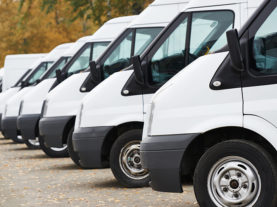Members can read the latest updates and guidance following the Chancellor's 2021 Budget. Chancellor Rishi Sunak delivered the Budget on Wednesday 3 March setting out his three-part plan to protect the jobs and livelihoods of the British people.
The Chancellor provided support and incentives where they are needed most. The Budget announcements will help BVRLA members and their customers to bounce-back from the economic impacts of the COVID pandemic and focus on decarbonising their fleets.
We were disappointed that the Government gave no further indication of the longer-term motoring tax roadmap it will use to drive decarbonisation.
Read the press release issued on 03 March 2021: BVRLA welcomes focus on COVID support and decarbonisation.
Covid support measures
Policy 1: Coronavirus Job Retention Scheme (Furlough)
Will be extended until the end of September. Employers will be expected to pay 10% towards the hours their staff do not work in July, increasing to 20% in August and September, as the economy reopens.
BVRLA view: This was a policy ask in our letters to the Chancellor and we are pleased to see continued support for firms and their staff beyond the current dates for the end of restrictions.
Policy 2: Eligible retail, hospitality and leisure businesses pay no business rates for 3 months, with up to 66% relief for the rest of the year.
This measure grants a 100% business rates discount to businesses occupying eligible retail, hospitality and leisure properties in England for three months from 1 April 2021. For the remainder of the financial year, these properties will receive a 66% discount with a cap of £2 million per business for those that were required to close as at 5 January 2021 and a cap of £105,000 per business for those that were not required to close. Businesses can choose to opt out of the relief.
BVRLA view: This was another policy ask in our letters to the Chancellor and one which members, especially rental firms, had highlighted as important in our Business Impact Survey. We are pleased to see the continuation of rates relief into 2022.
Policy 3: Restart grants and additional discretionary business grant funding
The government will provide ‘Restart Grants’ in England of up to £6,000 per premises for non-essential retail businesses and up to £18,000 per premises for hospitality, accommodation, leisure, personal care and gym businesses.
The government is also providing all local authorities in England with an additional £425 million of discretionary business grant funding, on top of the £1.6 billion already allocated.
BVRLA view: While Restart Grants will not assist the vehicle rental sector, which has ‘essential retail’ status, increased funding for the discretionary grants could well support those struggling with reduced levels of business. The BVRLA has written to the Sectary of State for BEIS asking the department to give more detailed guidance to local authorities, making it clear that rental firms are eligible for local authority discretionary grants.
Policy 4: Extended the temporary reduced VAT rate for hospitality and tourism.
The government announced at Budget 2021 that the temporary reduced rate will be extended for a further six-month period at 5% until 30 September 2021. A new reduced rate of 12.5% will then be introduced which will end on 31 March 2022. The scope of the relief will remain unchanged.
BVRLA view: This is a welcome continuation of the previous temporarily reduced VAT rate and will benefit motorhome and campervan rental operators once travel and holiday restrictions are lifted.
Policy 5: New government-backed UK-wide Recovery Loan Scheme
From 6 April 2021 the Recovery Loan Scheme will provide lenders with a guarantee of 80% on eligible loans between £25,000 and £10 million The scheme will be open to all businesses, including those who have already received support under the existing COVID-19 guaranteed loan schemes.
BVRLA view: Providing longer-term loan support is a welcome step.
Policy 6: Support for airports
The government is renewing the Airports and Ground Operations Support Scheme for a further six months from the start of 2021-22. This will provide support for eligible businesses in England up to the equivalent of half of their business rates liabilities during 2021-22, subject to certain conditions and a cap per claimant of £4 million
BVRLA view: The association hopes that airports operators will be able to pass on some of this support in the form of reduced charges for on-site rental outlets.
Decarbonisation
Policy 1: 130% Super Deduction for main rate assets and 50% First Year Allowance for special rate assets for two years
This measure will allow companies to claim 130% in-year relief for main rate capital expenditure on plant and machinery and 50% in-year relief for special rate capital expenditure, excluding operating leases, second-hand assets and cars from 1 April 2021 to 31 March 2023. Detailed guidance is given here: link.
BVRLA view: The association asked for a “Green Investment Allowance” in our representation to for Budget 2021. We are very glad to see HM Treasury using this mechanism for all plant and machinery. While this does not apply to vehicles, it does include chargepoints. The BVRLA is seeking further clarity from HM Treasury on whether it covers any of the ancillary costs associated with chargepoint installation, for example cabling and groundworks.
Motoring Taxes
Policy 1: Fuel duty will remain frozen for the eleventh consecutive year.
BVRLA view: A welcome respite for the motorist.
Policy 2: HGV Road User Levy: suspend for a further 12 months from August 2021
BVRLA view: As there is not yet a newly established approach to the HGV Road User Levy which would be compliant with the UK’s international responsibilities, we believe this is the prudent approach. We will continue to engage with Government so that when the HGV Road User Levy returns it will work for our members. The BVRLA's fact sheet on the HGV Road User Levy has been updated.
Policy 3: HGV VED frozen 2021-2022
BVRLA view: This is another good measure to try to assist hauliers given the impact of Covid-19.
Policy 4: Vehicle Excise Duty (VED)
The government will uprate VED rates for cars, vans and motorcycles in line with RPI from 1 April 2021. The BVRLA's fact sheet on VED has been updated.
BVRLA view: HM Treasury is still looking at the VED regime and the BVRLA will continue to engage with officials to ensure any future reform will work for members.
Policy 5: Fuel benefit charges and the van benefit charge
As announced by Written Ministerial Statement on 4 February 2021, the government will increase the van benefit charge and the car and van fuel benefit charges by the September 2020 Consumer Price Index. The BVRLA's fact sheet on fuel benefit charges and the van benefit charge fact sheet has been updated.
The change will have effect on and after 6 April 2021.
Other announcements
Policy 1: Corporation Tax: 19% rate for profits up to £50,000, tapering to main rate of 25%for profits over £250,000, from April 2023
This measure introduces a Small Profits Rate (SPR) of Corporation Tax (CT) at 19%for companies with annual profits below £50,000 and a main rate of 25% for all other companies. Marginal relief is available for companies with annual profits between £50,000 and £250,000, such that they pay CT at an overall rate between 19 per cent and 25 per cent. It will be implemented from April 2023.
BVRLA view: This is the first clear sign from the Chancellor of his intention to pay for all the spending on Covid-19 support. We will continue to highlight the need for foresight and certainty in HM Treasury policymaking on other tax measures.
Policy 2: Extended Loss Carry Back
The trading loss carry-back rule will be temporarily extended from the existing one year to three years. This will be available for both incorporated and unincorporated businesses.
- Unincorporated businesses and companies that are not members of a corporate group will be able to obtain relief for up to £2 million of losses in each of 2020-21 and 2021-22
- Companies that are members of a corporate group will be able to obtain relief for up to £200,000 of losses in each of 2020-21 and 2021-22 without any group limitations
- Companies that are members of a corporate group will be able to obtain relief for up to £2 million of losses in each of 2020-21 and 2021-22, but subject to a £2 million cap across the group as a whole
Policy 3: Levelling-up fund
The government is launching the prospectus for the £4.8 billion Levelling Up Fund today.
The Fund will invest in infrastructure, including town centre and high street regeneration, local transport projects, and cultural and heritage assets.
Policy 4: Government intends to announce some consultations separately from the Budget
They will publish a Command Paper, ‘Tax policies and consultations (Spring 2021)’ on 23 March 2021.
BVRLA view: We will monitor these outputs and engage with policy makers and members to ensure the sector's views are heard.
Updated Guidance



